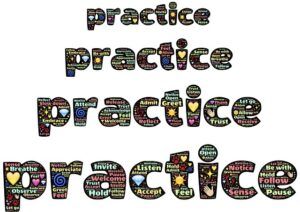Are you interested in learning French, but it’s difficult for you? So much vocabulary, so many strange sounds, incomprehensible grammar… It may seem like an insurmountable task for many, while for others it’s a walk in the park. What can you do about it? Have you tried and failed? Are you afraid to even start? Don’t worry. Here we will share with you 10 tips for learning French.
Learning a language is not always easy. The good thing is we have more resources than ever before. Our parents and grandparents were limited to books and in-person classes. We, on the other hand, can study at home on our computers or smartphones. Isn’t that great?
Below are some tips that have worked for me. I hope you find them useful. Check them out.
1. Identify Your Learning Style

We all learn differently. This is one of the biggest flaws in many education systems around the world. There is no such thing as one size fits all. This applies to all subjects, including French. Here comes the problem. Schools assume students can all learn in the same way.
Education experts have identified 7 learning styles:
- Visual (pictures, images, etc.)
- Aural (sounds, music, etc.)
- Verbal (speech and writing)
- Physical (movement)
- Logical (logic, structures, systems)
- Social (interaction with others)
- Solitary (self-study)
You might learn better by using sounds or images, while others might prefer to use their bodies. You don’t have to limit yourself to just one style as they sometimes overlap.
I remember discussing with someone about languages. He argued the only way to learn a language was through cultural immersion. While it certainly helps, it’s by no means the only way we can learn a language.
So, the first recommendation I can give to you is to identify your learning style.
2. Use as Many Resources as Possible

Once you identify your learning style, it’s time to look for learning resources. This includes books, magazines, newspapers, CDs, DVDs, podcasts, movies, etc. You might be concerned about money and justifiably so. The good news is there are many free resources available. You can visit your local public library and borrow books or use their computers. Or, if you have internet at home, you can learn French on YouTube.
Studying online might be your best bet. You can have access to a myriad of resources such as e-courses, videos, podcasts, music, online publications, social media, language apps, and much more. You can also connect with foreigners that speak your target language, and you could both participate in a language exchange.
There are no excuses for not learning French. Either online or offline, the number of resources at your disposal is huge.
3. Hire a Teacher/Tutor

At one point or another, you will have to study with a teacher if you’re serious about learning the language. You can do this from the beginning or when you have some mastery of the language. Classes are not that expensive. You can study with a teacher or tutor online. We explained the difference in another post.
When looking for a tutor, I recommend you choose a native speaker. There are several benefits to it:
- Improve your listening skills.
- Learn proper grammar and vocabulary.
- Learn slang.
- Practice your pronunciation.
- Receive feedback.
- Ask questions.
- Learn about French culture.
If you prefer in-person classes, you can do that too. It might be a little more expensive, but you will be able to interact with others, something that’s different when studying online.
4. Set Time Aside to Study

We all have busy lives, and it’s sometimes hard to set time aside to do something. Many people complain about not having time to do this or that. Work, family, and life, in general, are too demanding. When are we supposed to study?
Discipline is key. You might have to get up a little earlier. Some people say it’s easier to get things accomplished in the morning. You might also study a bit during your lunch break. If none of these work for you, then set some time aside in the evening and/or weekends.
It’s recommended to study at least 30 minutes a day instead of doing longer sessions over a couple of days. Whatever time of the day and frequency you choose, it’s important to be consistent. Make it part of your life and stick to it.
5. Don’t Ask Why

We have to understand that languages have similarities and differences. When French and our native language are similar, it’s a breeze. However, we run into trouble when they differ.
French has its particularities. Some of them don’t make sense to us, but the French could say the same thing about our native language. Instead of questioning why French numbers are so complicated or why they don’t pronounce half of the letters in a word, we should focus on learning the rules as they are.
I’ve seen a lot of people getting frustrated for not understanding the whys. All languages have some degree of “weirdness”, and we have to deal with it.
6. Stop Translating Everything

This is a common practice among French learners. They translate everything they see or hear word by word. Stop doing that! Some things don’t even make sense. I can tell you from experience.
There is some controversy as to whether we should translate when we learn a language. We might feel tempted to do it when starting. The problem is we tend to rely too much on it. Let me set an example.
How many times have you seen a French movie with English subtitles? Did you concentrate more on reading the subtitles than actually trying to listen and understand what was being said? That’s exactly the problem.
I recommend translating as little as possible. Avoid it if possible.
7. Don’t Be Afraid to Make Mistakes

Some people freeze at the moment of speaking. They can read, write, and understand French when hearing it, but they just can’t (or don’t think they can) speak it.
They may have had bad experiences in the past where someone didn’t understand them. That might have diminished their confidence, and they avoid trying to speak as a result. They are afraid that the same thing will happen, or they think someone will make fun of them.
Others are more daring and don’t care whether they make mistakes or not. After all, mistakes are part of the process. Many people, even after years of studying, make mistakes now and then. Don’t be afraid to make mistakes.
8. Practice, Practice, Practice!

It’s important to practice as you learn. Remember that practice makes perfect. Practice as much as you can. This way you will be able to succeed.
You can practice by studying a grammar lesson, learning new vocabulary, watching a movie, listening to music, reading a newspaper, listening to a podcast, watching the news, taking a class, attending a French meetup, participating in a language exchange, etc. You can do it at home or on the go. Be creative! If your daily commute is long, make the most of it by listening to the latest podcast or your favorite jams!
You can practice by yourself or with others. Some people prefer to do it in their rooms or a closed space free of distractions. Others prefer company, but that is up to you.
9. Surround Yourself with Supportive People

Just like dieting, it’s important to surround yourself with people who share your interests. This way it will be easier to stay motivated. When you share the journey with others, you make yourself accountable for your progress. There is a nice sense of competition within the group which will force you to make your best to learn.
Although you can find moral support in your parents, friends, or significant other, if they don’t share your passion for French, it will not be as effective. Support from others with your same interests is more powerful.
10. Immerse Yourself in French Culture

Last but not least, one of the best ways to learn French is by immersing yourself in the culture. Ideally, you could spend six months or a year in France or any other French-speaking region. Remember the Francophonie not only includes France but also other countries like Switzerland, Belgium, Luxembourg, Canada, and several African countries.
You can enroll in a language school and stay on campus or with a host family. That depends on the school and/or your preferences.
You can also live by yourself and just dive in. You will have to practice French when you go to the store, to a restaurant, to a museum, etc. This is a great way to overcome your fears of speaking.
However, if living abroad is not an option, you can try local French meetups in your city. You can try Meetup or Internations, among other applications. You will probably find French people who might be interested in speaking with you.
Don’t forget the other resources you have. Listen to music, watch movies, read newspapers, soak up as much French as you can. It’s not the same as living in France, but it’s a good start.
Summary
There you have it. There are several strategies you could use in your learning. To summarize, today we shared with you 10 tips for learning French:
- Identify your learning style.
- Use as many resources as possible.
- Hire a teacher/tutor.
- Set time aside to study.
- Don’t ask why.
- Stop translating everything.
- Don’t be afraid to make mistakes.
- Practice, practice, practice!
- Surround yourself with supportive people.
- Immerse yourself in French culture.
There are, of course, more tips you could try. Which ones have you tried? Which ones have worked for you? What would you add to the list? Let me know in the comments section below. Au revoir, les amis!



You have offered some great hints for learning to speak French. I don’t speak a 2nd language and do know from when I have tried to learn, it is difficult. Your 10 Tips are all great for learning any language I would think. The ideas are basic and would help get a good habit of study and review going. When I tried to learn Spanish, I didn’t approach it in a very sincere way, and of course, the results were not good. Having a schedule to study, and spend some time reviewing what you have learned would be practical.
Then to add more resources, that is really one idea that I had not thought about. I can see that having videos, books, magazines, tutors, all sorts of different learning experiences help our minds retain and actually learn the new language. This makes the project of learning a 2nd language seem like something I could do. Thank you for the information.
Hey, Sami,
You’re right. You can take this approach to learn any language you want. There are so many things you could do. I recommend trying as many of them as you can and stick to the ones that work for you.
Thanks for commenting.
Your hints and tips are all very important and I like the fact that you brought out everything into different points to explain why you have given the highlight. You see, one thing I believe about learning a language is that to fully understand it properly, you need to immerse yourself in the history and culture of the people. This also goes with French and I will be sure to do just that before my French learning class starts.
Hi, Payton,
Oh, yeah, that’s a given. However, I still don’t think it’s the only way to learn a language. Well, we all think differently.
Thanks for commenting.